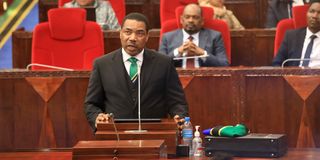Government warns of emerging threats to 2025/26 budget implementation

Finance and Planning minister, Dr Mwigulu Nchemba, presents the 2025/26 National Budget in Parliament, Dodoma, on June 12, 2025. Photo | Edwin Mjwahuzi
What you need to know:
- These include volatility in global commodity prices, rising interest rates, depreciation of the Tanzanian shilling, and the burden of contingent liabilities.
Dodoma. The government has issued a cautionary note on the implementation of the 2025/26 national budget, pointing to a growing list of domestic and global risks that could disrupt fiscal stability and derail key development targets.
Tabling the budget in Parliament on Thursday, Minister for Finance Dr Mwigulu Nchemba identified several fiscal risks that may compromise revenue collection, delay project execution, and inflate government expenditures.
These include volatility in global commodity prices, rising interest rates, depreciation of the Tanzanian shilling, and the burden of contingent liabilities.
“The fiscal environment we operate in today is highly interconnected and unpredictable,” Dr Nchemba told legislators. “We must be proactive in identifying and managing risks that could adversely affect the national budget.”
The minister also highlighted non-financial risks such as climate change, natural disasters, and geopolitical tensions. In addition, he warned of the growing threat posed by cyberattacks targeting public financial management and ICT systems.
Changes in policies by Tanzania’s Development Partners and shifting diplomatic landscapes were also flagged as potential disruptors of aid and concessional financing, which remain critical to the country’s budget framework.
Should these risks materialize, Dr Nchemba warned of several consequences: failure to meet revenue collection targets, rising costs of goods and services, delayed project implementation, and increased government debt servicing obligations.
Other negative outcomes could include an expanding budget deficit, a drop in agricultural production, infrastructure damage, and growing arrears owed to contractors and service providers.
In response, the government plans to intensify the implementation of mitigation measures aimed at safeguarding economic resilience.
Among the key strategies is the prudent management of fiscal and monetary policies, as well as continued enforcement of the National Strategy for Improving the Availability of Foreign Exchange.
The government is also advancing its National Clean Cooking Strategy (2024–2034) to address energy-related vulnerabilities, and will further implement the National Environmental Master Plan for Strategic Interventions (2022–2032) to build long-term sustainability.
In addition, cyber resilience will be strengthened through enhanced safeguards in public financial systems. Dr Nchemba reaffirmed the government's commitment to enforcing the Government Loans, Guarantees, and Grants Act (CAP 134) as part of efforts to maintain debt sustainability.





